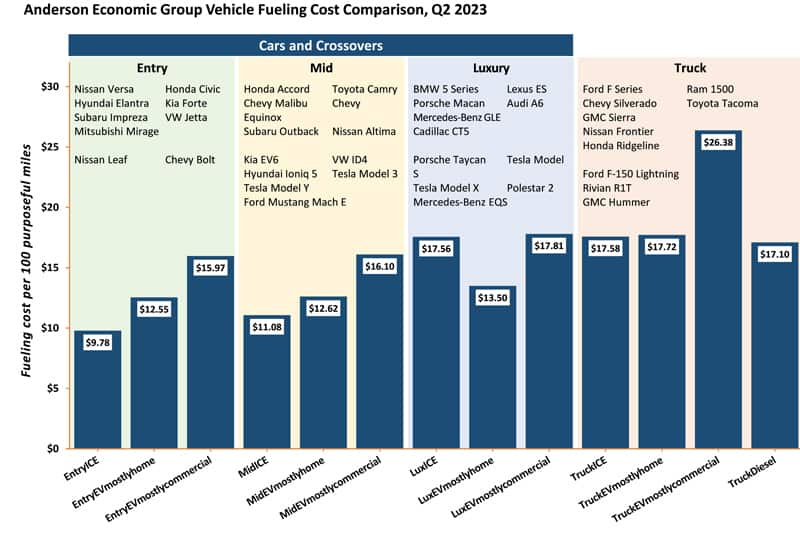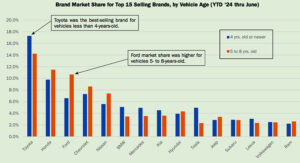Mid-priced ICE cars cost $11 to drive 100 miles; comparable EVs cost $12 to $16 depending on charging modality
East Lansing, Mich.—Anderson Economic Group (AEG) has released fueling cost estimates for comparable internal combustion engine (ICE) vehicles and electric vehicles (EV) in the first half of 2023. AEG followed the methodology it developed for fueling cost studies that began in 2021.
For 2023, AEG has updated gasoline and residential electricity prices, commercial charging prices, tax rates levied on fuel and EVs, fuel economy for popular models in each segment, and the allowance for travel to commercial charging stations. The analysis considers four categories of real-world costs for both ICE and EVs, including energy, taxes, pump or charger, and deadhead miles.
Overview of Findings by Vehicle Type, Q2 2023
- Entry-priced cars and crossovers: In the entry-priced segment, gas-powered cars were the most economical to fuel at around $9.78 per 100 purposeful miles. That’s significantly more affordable than an entry-priced EV charged mostly at home ($12.55), and it’s a dramatic savings over an EV charged mostly at commercial charging stations ($15.97).
- Mid-priced cars and crossovers: ICE vehicles were also more affordable to fuel in this segment, at approximately $11.08 per 100 miles. This cost is lower than that for primarily home EV charging ($12.62) and for mostly commercial EV charging ($16.10).
- Luxury-priced cars and crossovers: In the luxury segment, electric vehicles charged mostly at home were the most economical. High-end EV drivers paid around $13.50 per 100 miles, as opposed to the $17.56 it would have cost to fuel a comparable ICE car. Luxury EV drivers charging mostly commercially, however, paid slightly more than they would have in an ICE vehicle ($17.81).
- Pickup trucks: At around $17.10 per 100 miles, diesel-powered trucks were less expensive to fuel than their gas or electric counterparts. Gasoline-powered pickups cost about $17.58 to fuel, while EV trucks charged mostly at home cost $17.72. Drivers of electric pickups who needed to charge commercially most of the time found themselves paying about $26.38 — exceeding their diesel counterparts by about $9.
EVs in New Segments in 2023
Until now, there were few electric options in the entry-priced car and pickup truck segments. With the introduction of new vehicles in these categories, AEG has begun to compare ICE and EVs fueling costs for them. For pickups, AEG compared the Ford F-150 Series, Toyota Tacoma, GMC Sierra, and other trucks with EV counterparts that include the Ford F-150 Lightning and the Rivian R1T. Comparison examples in the entry-priced segment include the Nissan Versa and Honda Civic in the ICE category, and the Nissan Leaf and Chevy Bolt EVs.
With electricity prices trending up and gas prices going down, most traditional gas-powered vehicles cost less to drive than their EV counterparts in the first half of 2023. Drivers of luxury-priced electric vehicles still could save a little money compared to driving high-powered ICE vehicles, especially those needing premium gas.
One surprise was that newly introduced electric pick-up trucks had fueling costs similar to those of traditional gas or diesel fueled ICE pickups, but only for drivers who could regularly charge at home or through their employer. For both businesses and those driving their own trucks, it is important to consider expected demands for travel to job sites, hauling, and extended road trips. These are likely to require regular commercial charging that can be expensive and time consuming.










Comments are closed.